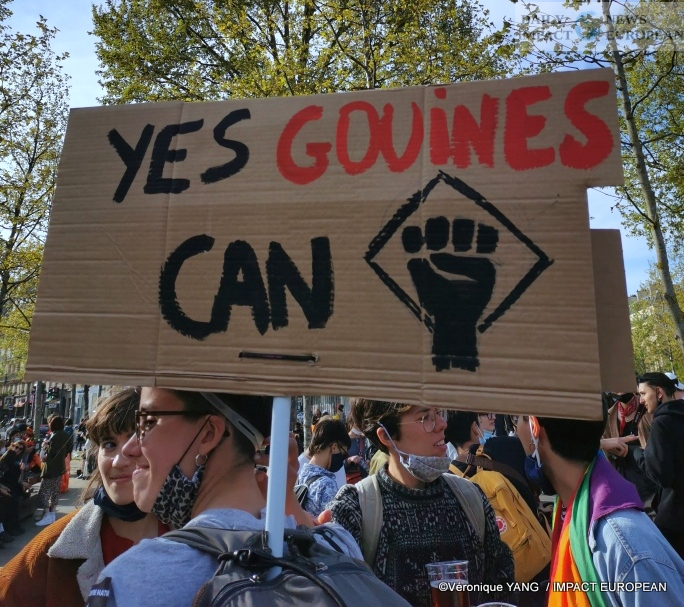Sunday April 25, a « PMA for all » march took place from Châtelet to the Republic. The day before, we celebrated « Lesbian Visibility Day ».
It was for the first time a march for lesbian visibility. The slogan was « Fight against the invisibility of homosexuals and demand access for all to medically assisted procreation (MAP) ». However, in the 1970s, the group of « radical lesbians of Jussieu » had launched the idea. In the United States, the first documented lesbian walk dates back to 1981
Parisian event
In Paris, the « Les Collages lesbiens » coordination was at the initiative of the event. The number of participants far exceeded the expected 500. A group of single-sex lesbians led the procession. All those who wished to provide their support followed, including processions of racialized and trans lesbians, to combine the struggles against racism, transphobia and lesbophobia.
In Lyon, Marseille, Bordeaux or Toulouse, other processions completed the Parisian March.
The procession, which left at 2 pm in a festive atmosphere, brought together 10,000 people (4,400 for the Prefecture). It hosted personalities including director Céline Sciamma, actress Adèle Haenel and elected Parisian environmentalist and lesbian activist Alice Coffin. For the latter, the event a « translation into manifestation » of the rise of the lesbian movement in recent years.
The participants demanded free access to assisted reproduction for all. Indeed, in February the Senate rejected the extension of the assisted reproduction to single women and female couples.
The crowd resumed slogans throughout the march. We heard:
« Free assisted reproduction is not negotiable for everyone. »
« Macron hypocrite, lesbians go to Belgium! »
« It is not negotiable the PMA, free, now. »
On the signs, mixed with the rainbow flags, we could read:
« Muslim and proud lesbians ».
« Feminism is theory, lesbianism is practice. »
« Lesbians against transphobia ».
« PMA: My body, My choice, My family ».
« I didn’t choose, but God, Thank you! »
Review of the law
The activists denounced a cheap law and the lesbian word completely absent from the debates around the bioethics law.
Emmanuel Macron had promised the opening of the PMA to all women, in the bioethics bill. This has been postponed several times. In addition, the health crisis has upset the parliamentary agenda for 2020 and froze the examination of parliamentary law.
The National Assembly voted for this flagship measure of the bill at second reading in the National Assembly in July 2020. But in February, the Senate adopted the text without opening the PMA to female couples and single women. . Following this rejection, the activists occupied the square of the Assembly. For the moment, there is no date officially fixed for the third passage of the text in front of the Palais Bourbon.
The revendications
The coordination of Les Collages Lesbiens is part of the « colleurs (euses) » movement. They date from the end of 2020 and are now several hundred sticking messages on the walls. Members reclaim a reserved public discourse, just like men, heterosexuals, whites. A way for lesbians to no longer be invisible They take back the space of speech and invade it with lesbian pride.
This year, the main demand is access to assisted reproduction for lesbian couples, just like heterosexual couples. This applies to anonymity, free and reimbursement but also to the possibility of donating his oocytes to his partner thanks to the ROPA method (the sharing of the In Vitro Fertilization process between the two mothers).
Since 2012 and until today, governments have proposed and rejected ART for all. This shows a certain denial of the needs of lesbians. The virtual absence of political and media debates that concern them and their families is proof of this.
Today, France only authorizes 2 techniques for ART: in vitro fertilization (IVF) and artificial insemination, but only for heterosexual couples. After the refusal of the Senate in the second pass, a joint committee, made up of deputies and senators, could find a compromise. According to calculations by the APGL (Association of Gay and Lesbian Parents and Future Parents) inseminations could not begin in France until 2022, between parliamentary shuttles and waiting lists for LDCs. Otherwise, this reform could not be promulgated until the end of the five-year term since it would still require a reading in each chamber and a final reading in the Assembly.
Views: 2

























Plus d'histoires
Grand Ciel Reaches the Big Screen
France: Thousands of Doctors March in Paris Against “Authoritarian Drift” in Healthcare System
Agricultural crisis: farmers bring protests to Paris over EU–Mercosur deal